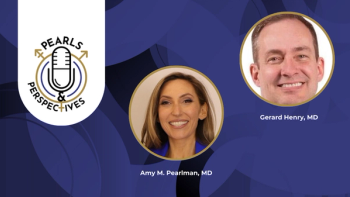
Study assesses biopsychosocial impact of Peyronie’s disease in MSM
"But both groups reported that Peyronie's disease does impact their mental health, and a large portion of both groups also said that they had had a negative experience with a urologist at some point," says Olivia Paulsen.
In this video, Olivia Paulsen highlights the background and key findings from the study, “A Contemporary Glimpse into the Perceptions, Characteristics, and Psychosocial factors of Peyronie's disease Among Men Who Have Sex With Men,” which was presented at the 2024 American Urological Association Annual Meeting in San Antonio, Texas. Paulsen is a medical student at Idaho College of Osteopathic Medicine in Meridian, Idaho.
Video Transcript:
I was super fortunate to work with Dr. Helen Bernie at Indiana University, and we decided to explore the biopsychosocial impact that Peyronie's disease has on men who have sex with men, because this is a very understudied population. So, we created an anonymous survey that was distributed among several online platforms. We went to Twitter, Instagram, a Peyronie's disease support group on Facebook, and several Reddit forums. We invited men who have sex with men (MSM) and men who do not have sex with men, which I'll refer to as non-MSM to complete the survey so that we could compare results between the 2 groups. Our survey had 28 questions not including the validated Peyronie's disease questionnaire, because that was only completed by those who also partake in vaginal intercourse. Questions we asked included, but were not limited to, history of trauma, degree of curvature, medical and surgical interventions for their Peyronie's disease, how Peyronie's disease impacts their mental health, partner and self bother and their experience with a urologist.
We found in our results, that there was no statistically significant difference in any of our variables between the 2 groups. But both groups reported that Peyronie's disease does impact their mental health, and a large portion of both groups also said that they had had a negative experience with a urologist at some point. So, while none of our findings were statistically profound, I think it's really important to consider the limitations of this study when interpreting our results. One example that I like to give was our question on painful intercourse. With that, we found that men who have sex with men who engage in more anal intercourse also reported that they were having more painful intercourse by about 15%. So, I think it's really important to consider those factors, look at the whole picture, and understand that this is still a really important study that contributes to the paucity of data that we have on men who have sex with men. We've learned a lot from this study, and we're hoping to implement it in future studies, like improving the granularity of our questions and hoping to get a greater response from men who have sex with men.
This transcription has been edited for clarity.
Newsletter
Stay current with the latest urology news and practice-changing insights — sign up now for the essential updates every urologist needs.






